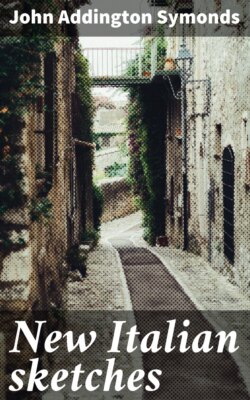Читать книгу New Italian sketches - John Addington Symonds - Страница 7
На сайте Литреса книга снята с продажи.
III.—Fosdinovo.
ОглавлениеTable of Contents
The hamlet and the castle of Fosdinovo stand upon a mountain-spur above Sarzana, commanding the valley of the Magra and the plains of Luni. This is an ancient fief of the Malaspina House, and still in the possession of the Marquis of that name.
The road to Fosdinovo strikes across the level through an avenue of plane trees, shedding their discoloured leaves. It then takes to the open fields, bordered with tall reeds waving from the foss on either hand, where grapes are hanging to the vines. The country-folk allow their vines to climb into the olives, and these golden festoons are a great ornament to the grey branches. The berries on the trees are still quite green, and it is a good olive season. Leaving the main road, we pass a villa of the Malaspini, shrouded in immense thickets of sweet bay and ilex, forming a grove for the Nymphs or Pan. Here may you see just such clean stems and lucid foliage as Gian Bellini painted, inch by inch, in his Peter Martyr picture. The place is neglected now; the semicircular seats of white Carrara marble are stained with green mosses, the altars chipped, the fountains choked with bay leaves; and the rose trees, escaped from what were once trim garden alleys, have gone wandering a-riot into country hedges. There is no demarcation between the great man's villa and the neighbouring farms. From this point the path rises, and the barren hill-side is a-bloom with late-flowering myrtles. Why did the Greeks consecrate these myrtle-rods to Death as well as Love? Electra complained that her father's tomb had not received the honour of the myrtle branch; and the Athenians wreathed their swords with myrtle in memory of Harmodius. Thinking of these matters, I cannot but remember lines of Greek, which have themselves the rectitude and elasticity of myrtle wands:
καὶ προσπεσὼν ἔκλαυσ᾽ ἐρημίας τυχὼν
σπονδάς τε λύσας ἀσκὸν ὄν φέρω ζένοις
ἔσπεισα τύμβῳ δ᾽ ἀμφέθηκα μυρσίνας.
As we approach Fosdinovo, the hills above us gain sublimity; the prospect over plain and sea—the fields where Luna was, the widening bay of Spezzia—grows ever grander. The castle is a ruin, still capable of partial habitation, and now undergoing repair—the state in which a ruin looks most sordid and forlorn. How strange it is, too, that, to enforce this sense of desolation, sad dishevelled weeds cling ever to such antique masonry! Here are the henbane, the sow-thistle, the wild cucumber. At Avignon, at Orvieto, at Dolce Acqua, at Les Baux, we never missed them. And they have the dusty courtyards, the massive portals, where portcullises still threaten, of Fosdinovo to themselves. Over the gate, and here and there on corbels, are carved the arms of Malaspina—a barren thorn-tree, gnarled with the geometrical precision of heraldic irony.
Leaning from the narrow windows of this castle, with the spacious view to westward, I thought of Dante. For Dante in this castle was the guest of Moroello Malaspina, what time he was yet finishing the "Inferno." There is a little old neglected garden, full to south, enclosed upon a rampart which commands the Borgo, where we found frail canker-roses and yellow amaryllis. Here, perhaps, he may have sat with ladies—for this was the Marchesa's pleasance; or may have watched through a short summer's night, until he saw that tremolar della marina, portending dawn, which afterwards he painted in the "Purgatory."
From Fosdinovo one can trace the Magra work its way out seaward, not into the plain where once the candentia mœnia Lunæ flashed sunrise from their battlements, but close beside the little hills which back the southern arm of the Spezzian gulf. At the extreme end of that promontory, called Del Corvo, stood the Benedictine convent of S. Croce; and it was here in 1309, if we may trust to tradition, that Dante, before his projected journey into France, appeared and left the first part of his poem with the Prior. Fra Ilario, such was the good father's name, received commission to transmit the "Inferno" to Uguccione della Faggiuola; and he subsequently recorded the fact of Dante's visit in a letter which, though its genuineness has been called in question, is far too interesting to be left without allusion. The writer says that on occasion of a journey into lands beyond the Riviera, Dante visited this convent, appearing silent and unknown among the monks. To the Prior's question what he wanted, he gazed upon the brotherhood, and only answered, "Peace!" Afterwards, in private conversation, he communicated his name and spoke about his poem. A portion of the "Divine Comedy" composed in the Italian tongue aroused Ilario's wonder, and led him to inquire why his guest had not followed the usual course of learned poets by committing his thoughts to Latin. Dante replied that he had first intended to write in that language, and that he had gone so far as to begin the poem in Virgilian hexameters. Reflection upon the altered conditions of society in that age led him, however, to reconsider the matter; and he was resolved to tune another lyre, "suited to the sense of modern men." "For," said he, "it is idle to set solid food before the lips of sucklings."
If we can trust Fra Ilario's letter as a genuine record, which is unhappily a matter of some doubt, we have in this narration not only a picturesque, almost a melodramatically picturesque glimpse of the poet's apparition to those quiet monks in their seagirt house of peace, but also an interesting record of the destiny which presided over the first great work of literary art in a distinctly modern language.
